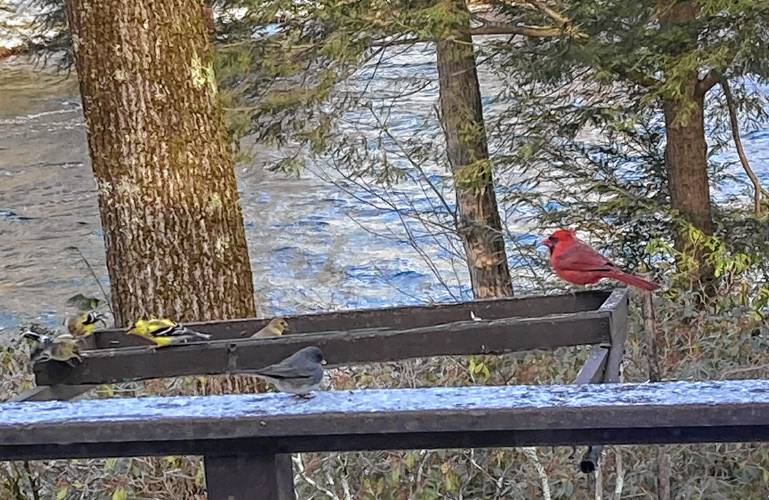My Turn: A treat at the bird feeder

A cardinal, several goldfinches, and a junco at our bird feeder. CONTRIBUTED/CAROLE GARIEPY
| Published: 04-09-2024 4:02 PM |
We feed the birds. In fact, we feed the birds every morning before we feed ourselves, and then while we are eating our cereal we watch them dining on their seeds. We are always awed at their beauty and entertained by their interactions with each other as they feed.
This year we’ve had lots of juncos, their dark colors contrasting so well with the snow. Chickadees are always a delight, so much energy as they flit so quickly about. Finches must be very social as they always seem to come with relatives, and it’s fascinating to see their dull plumage change to bright yellow as spring comes.
The sure-footed nuthatch is amazing to watch walk down the tree before it flies to the feeder. The titmouse is kind of a dull gray, but I think it looks quite stately with its cute tufted crown. Everyone admires the magnificent male cardinal with its brilliant red attire, but I always feel sorry for its spouse who only has brown feathers to display; I wonder if her mate feels sorry for her too as I sometimes see him caringly feed her seeds from his bill.
We always hope to have the appearance of a new variety, and this year we were thrilled to have a bluebird visit for the first time. Yes, a thrill. Birds can be thrilling to watch. Wouldn’t they be surprised to know what delight they give us humans, and like humans, they have different personalities. Some are timid, some aggressive, some are comfortable with others feeding at their sides; some fly in and grab a seed and quickly fly off; others stay and feed in a relaxing manner.
Many people drive away squirrels when they come to the feeder, and some work hard to devise a way that the squirrels can’t reach the feeder. There are feeders designed to be squirrel-proof. True, they gobble up a lot of food, but I admire their antics and how smart and clever they are. We had one friend who was very annoyed by the squirrels and would rush out the door to drive them away from the feeder. One day she slipped on ice and broke an ankle. That episode made me decide that guarding the bird feeder from intruders wasn’t worth the stress or physical danger that could accompany it. They are all God’s creatures, let them all eat.
Now I have to get to the appearance at our feeder that inspired me to write this story. A black squirrel! Yes, a black squirrel came to our feeder four times. We were so excited. He was beautiful, however quite bold. (I’m calling it a “he” because it was aggressive, but of course I don’t know for sure if it was a guy and or girl.)
He aggressively drove away the gray squirrels and feasted on sunflower seeds uninterrupted. No bird or squirrel challenged him. We watched in awe, and after he left we did some research. It’s impressive what researchers can learn. A black squirrel is a mutation of the gray squirrel. They found that the black fur is caused when a gray squirrel has a faulty pigment gene. Two black squirrels can produce a black baby, but a black and gray squirrel would produce gray offspring.
Article continues after...
Yesterday's Most Read Articles
 Carol Doucette of Royalston receives $15,000 from Publishers Clearing House
Carol Doucette of Royalston receives $15,000 from Publishers Clearing House
 State documents show Northfield EMS chief’s paramedic license suspended over failure to transport infant
State documents show Northfield EMS chief’s paramedic license suspended over failure to transport infant
 Plan calls for upgrades to Silver Lake in Athol
Plan calls for upgrades to Silver Lake in Athol
 Royalston’s FinCom debates proposed salary increases
Royalston’s FinCom debates proposed salary increases
 What are the protocols for emergency transport of infants?
What are the protocols for emergency transport of infants?
 Magic comes to Red Apple in Phillipston
Magic comes to Red Apple in Phillipston
An advantage the black squirrel has is that it keeps warmer because its darker coat captures more body heat. Only one in 10,000 gray squirrels are black, so we were pretty lucky to have one visit us.
The birds benefit from our feeding them, but I think we are benefiting more from the pleasure they give, and this year we had the bonus of a black squirrel. However, now we have stopped feeding till next winter. We don’t deter squirrels, but bears have come out of hibernation and they are not welcome.
Carole Gariepy lives in Phillipston.

